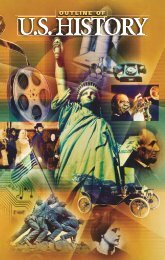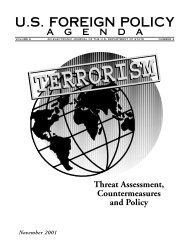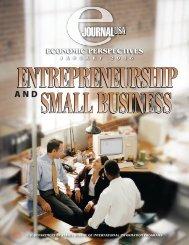Working for Women Worldwide - Embassy of the United States
Working for Women Worldwide - Embassy of the United States
Working for Women Worldwide - Embassy of the United States
Create successful ePaper yourself
Turn your PDF publications into a flip-book with our unique Google optimized e-Paper software.
Re<strong>for</strong>m Ef<strong>for</strong>ts. In October 2004, <strong>the</strong> State<br />
Department announced additional funding <strong>for</strong> economic,<br />
political, and educational re<strong>for</strong>m and women’s<br />
empowerment in Jordan, Algeria, Morocco, Tunisia,<br />
Egypt, <strong>the</strong> West Bank, and Gaza. Many <strong>of</strong> <strong>the</strong>se initiatives<br />
propose creative linkages among NGOs, government<br />
ministries, civil society, and businesses.<br />
Afghanistan and Iraq<br />
Afghanistan and Iraq provide vibrant examples <strong>of</strong><br />
why <strong>the</strong> <strong>United</strong> <strong>States</strong> invests so much in advancing<br />
education <strong>for</strong> women and girls.<br />
First Lady Laura Bush finds Afghanistan’s story<br />
particularly compelling: “One <strong>of</strong> <strong>the</strong> most inspiring<br />
places to witness <strong>the</strong> trans<strong>for</strong>mation education brings<br />
is in Afghanistan. Three years ago, 92 percent <strong>of</strong> girls<br />
did not attend school because <strong>the</strong> Taliban did not allow<br />
women to be educated. Today, nearly four million children<br />
are in school—including more than a million<br />
girls. Young girls, who were not allowed to leave <strong>the</strong>ir<br />
homes unless <strong>the</strong>y were accompanied by a male relative,<br />
who had to hide <strong>the</strong>ir books under <strong>the</strong>ir burkas,<br />
are now studying math and science.”<br />
By summer 2004, <strong>the</strong> <strong>United</strong> <strong>States</strong> had implemented<br />
more than 200 programs, including in education<br />
and training, that directly benefited Afghan<br />
women.<br />
The U.S.-Afghan <strong>Women</strong>’s Council, which<br />
encourages public-private partnerships between U.S.<br />
and Afghan women, has established a <strong>Women</strong>’s<br />
Teacher Training Institute in Kabul in cooperation<br />
with USAID. The institute will work with <strong>the</strong><br />
Afghan Literacy Initiative to help teach basic literacy<br />
to rural Afghan women. In addition, every six months<br />
some 30 Afghan women travel to <strong>the</strong> <strong>United</strong> <strong>States</strong> <strong>for</strong><br />
teacher training—and <strong>the</strong>y return to Afghanistan to<br />
train o<strong>the</strong>r teachers.<br />
The council has sponsored training as well in a<br />
variety <strong>of</strong> fields: training <strong>for</strong> women journalists and<br />
new entrepreneurs, literacy education <strong>for</strong> women in<br />
<strong>the</strong> traditional carpet industry, and training in health<br />
care <strong>for</strong> rural communities. Two noteworthy initiatives<br />
in <strong>the</strong> latter area are <strong>the</strong> training <strong>of</strong> midwives and distribution<br />
<strong>of</strong> <strong>the</strong> “talking” Afghan Health Book, an<br />
interactive publication with basic in<strong>for</strong>mation that is<br />
being distributed in Dari and Pashto across rural<br />
Afghanistan (see p. 22 <strong>for</strong> details).<br />
A key to education is connection, not only<br />
between students and teachers, but among <strong>the</strong> larger<br />
global community <strong>of</strong> colleagues, experts, mentors, and<br />
pr<strong>of</strong>essionals. In Afghanistan, <strong>the</strong> <strong>United</strong> <strong>States</strong> has<br />
conducted a diverse set <strong>of</strong> educational and cultural<br />
exchanges directed at women. For example, after<br />
restoration <strong>of</strong> <strong>the</strong> Fulbright exchange program to<br />
Afghanistan, four women were among <strong>the</strong> first 20<br />
Afghan university students selected <strong>for</strong> <strong>the</strong> academic<br />
year 2004-2005.<br />
By 2004, girls in Iraq were enrolling in <strong>the</strong> more<br />
than 2,300 renovated schools. Their rates <strong>of</strong> attendance<br />
are now higher than <strong>the</strong>y were in <strong>the</strong> pre-war<br />
period. Partnerships between U.S. and Iraqi universities<br />
have been streng<strong>the</strong>ned as well, and six women<br />
were among <strong>the</strong> first class <strong>of</strong> 25 Iraqi Fulbright students.<br />
The <strong>United</strong> <strong>States</strong> is supporting <strong>the</strong> creation <strong>of</strong><br />
nine <strong>Women</strong>’s Centers in Baghdad and 11 regional<br />
<strong>Women</strong>’s Centers throughout <strong>the</strong> country. At <strong>the</strong>se<br />
centers, and through <strong>the</strong> U.S.-Iraq <strong>Women</strong>’s Network<br />
<strong>of</strong> public-private partnerships and <strong>the</strong> Iraqi <strong>Women</strong>’s<br />
Democracy Initiative, women can gain knowledge and<br />
expertise in entrepreneurship, democracy education,<br />
political organization, leadership, and coalition building.<br />
The $10 million Democracy Initiative, <strong>for</strong> example,<br />
will “help women become full and vibrant partners<br />
in Iraq’s developing democracy,” said U.S. Under<br />
Secretary <strong>of</strong> State <strong>for</strong> Global Affairs Paula<br />
Dobriansky. “We will give <strong>the</strong>m <strong>the</strong> tools to manage<br />
<strong>the</strong>ir own associations and to build coalitions with<br />
o<strong>the</strong>rs, and we will provide <strong>the</strong> in<strong>for</strong>mation and experience<br />
<strong>the</strong>y need to run <strong>for</strong> <strong>of</strong>fice, lobby <strong>for</strong> fair treatment,<br />
and lead Iraq’s emerging institutions.”<br />
Education <strong>for</strong> women is not just <strong>for</strong> <strong>the</strong> betterment<br />
<strong>of</strong> women alone. Even more so than in <strong>the</strong> past,<br />
education will be <strong>the</strong> key that builds tolerance and<br />
understanding and that unlocks futures <strong>of</strong> freedom,<br />
opportunity, and prosperity <strong>for</strong> all <strong>the</strong> peoples <strong>of</strong> <strong>the</strong><br />
world. As <strong>the</strong>n Secretary <strong>of</strong> State Colin Powell said in<br />
October 2004, in recognition <strong>of</strong> International<br />
Education Week: “Meeting <strong>the</strong> 21st century challenges<br />
that confront all countries requires an unprecedented<br />
degree <strong>of</strong> understanding and cooperation among<br />
nations and among leaders in every field.”<br />
For additional in<strong>for</strong>mation on <strong>the</strong>se and o<strong>the</strong>r<br />
U.S. government programs, see http://www.state.gov,<br />
http://exchanges.state.gov/, http://mepi.state.gov/<br />
c10175.htm, http://usawc.state.gov/index.htm, and<br />
http://www.usaid.gov/.<br />
Z<br />
13












